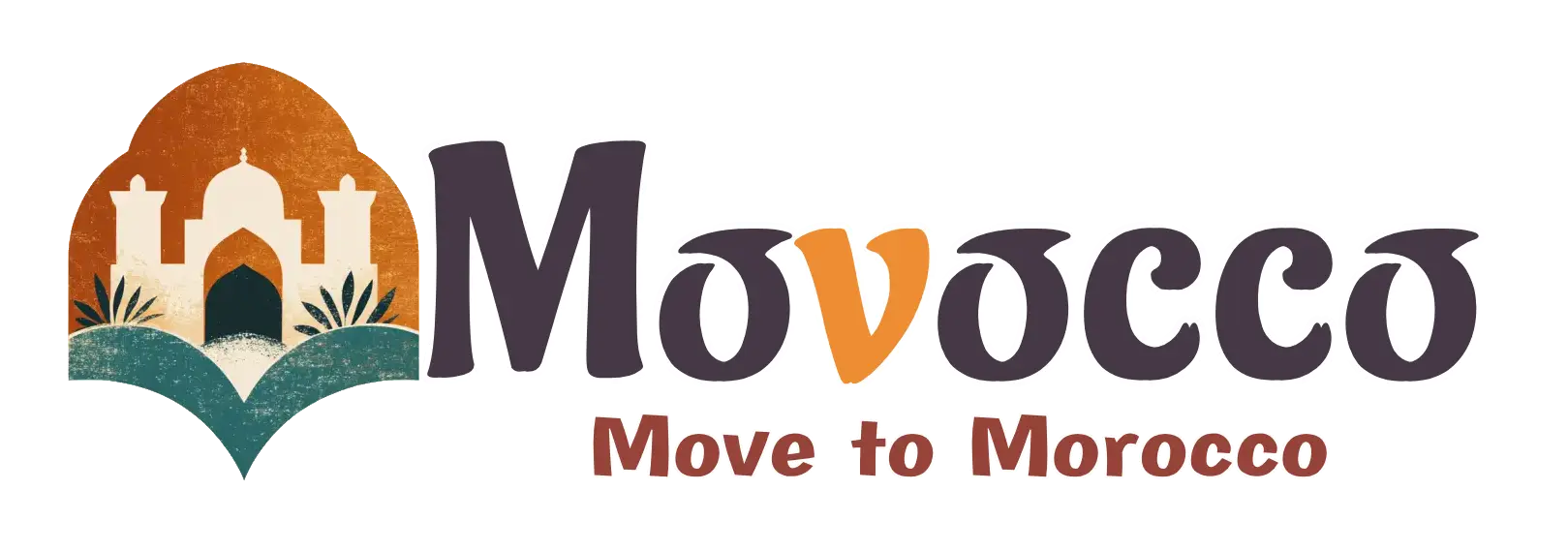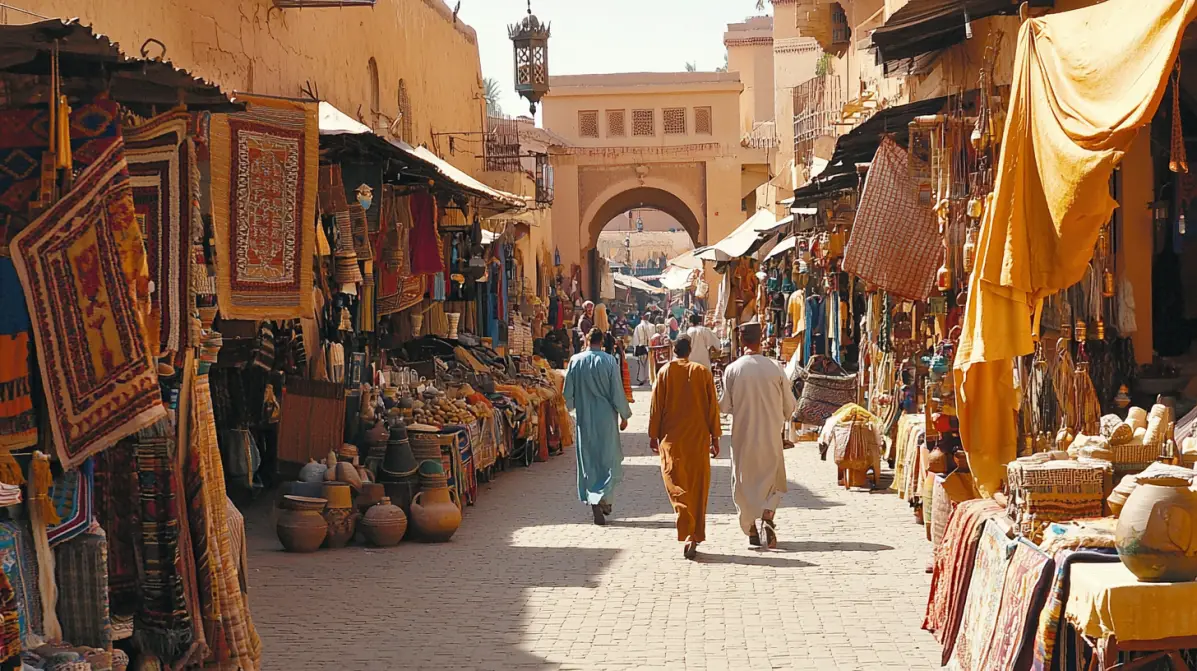Is Morocco Safe for Travel in 2024? A Comprehensive Guide for Expats & Tourists
“Is Morocco safe for expats and tourists? Whether you’re considering a temporary move or a visit, understanding Morocco’s safety landscape is essential for a worry-free stay.”
Morocco has become an increasingly popular destination, not only for tourists seeking adventure and culture but also for expatriates looking for a new place to call home. Known for its stunning landscapes, rich history, and vibrant cities, Morocco attracts millions of visitors each year, and many decide to stay longer than they originally planned. But the question of safety remains at the forefront of potential travelers’ and expats’ minds.
In recent years, Morocco’s reputation has grown not just as a great vacation spot but also as a country where expats can live comfortably. Americans, solo travelers, and retirees, in particular, are often curious about how safe it is to travel or settle in Morocco. This guide is designed to provide a comprehensive and up-to-date assessment of Morocco’s safety for both short-term visitors and long-term residents.
In the following sections, we’ll explore general safety concerns, political stability, crime rates, and how Morocco has taken steps to ensure the safety of its tourists and expatriate community. Whether you are traveling for a vacation, moving temporarily, or considering long-term residency, this guide will offer practical information to help you navigate Morocco with confidence.
Morocco’s Safety Overview for Expats and Tourists
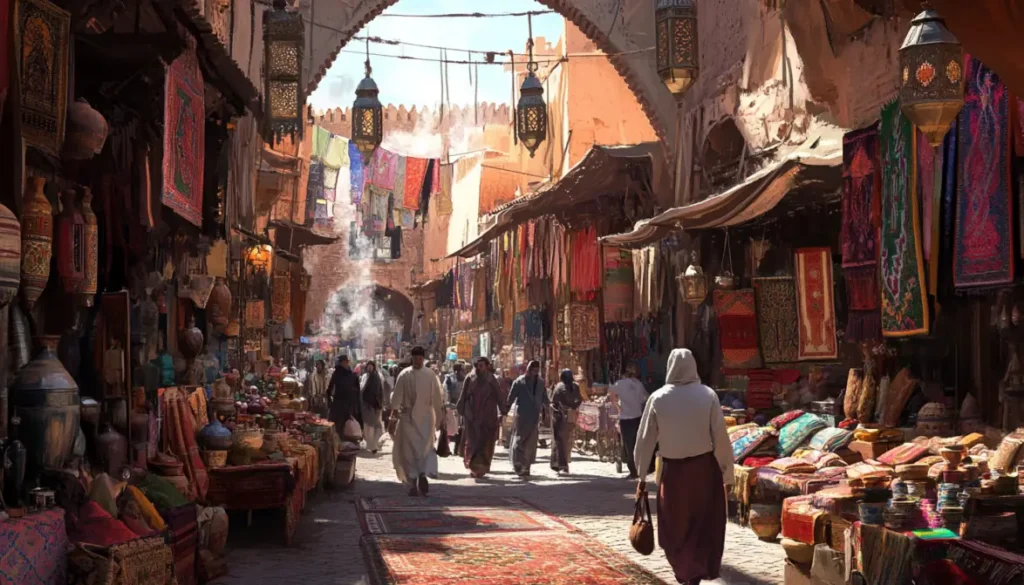
What Makes Morocco Safe for Tourists and Expats?
Morocco, located at the crossroads of Africa and Europe, has long been a cultural melting pot with a deep history of welcoming foreign visitors. From bustling souks to tranquil coastal towns, the country offers a wide variety of experiences, which is why it appeals to a broad audience. But when it comes to safety, what can tourists and expats truly expect?
1. General Safety Ratings for Morocco
When considering the question ‘how safe is Morocco?’, global safety rankings consistently show Morocco as one of the safer countries in the region. According to various travel advisories and global safety indexes, it is considered relatively safe, especially in comparison to some of its neighboring countries in North Africa and the Middle East. Tourists often feel secure in popular cities like Marrakech, Casablanca, Fes, and Rabat, where there is a heavy police presence, especially in areas frequented by foreigners.
Moreover, Morocco is politically stable, which adds to its overall safety profile. If you’re wondering, ‘is Morocco safe for tourists?,’ you’ll be reassured that the Moroccan government has worked hard to create a secure environment, particularly as tourism plays such a significant role in the economy. While petty crime exists, such as pickpocketing and scams aimed at tourists, violent crime remains rare, particularly in the areas most frequented by visitors and expats.
2. Political Stability and Crime Rates
One of the key factors that contribute to Morocco’s safety is its political stability. The country has enjoyed relative peace and order for decades, especially compared to other countries in the region. Morocco is a constitutional monarchy, and the government prioritizes both national security and economic stability. This focus helps ensure that citizens and visitors alike can move freely and safely within the country.
Crime in Morocco, while present, is mostly non-violent. The most common crimes tourists and expats may encounter include petty theft, such as pickpocketing, especially in crowded markets or busy squares like Djemaa el-Fna in Marrakech. Scams targeting tourists, such as inflated taxi fares or misleading tour guides, are also issues to watch for. However, these types of crimes can largely be avoided by exercising common sense precautions: keeping your valuables secure, avoiding unregulated services, and being aware of your surroundings.
The Moroccan government is also proactive in dealing with more serious threats, particularly when it comes to terrorism. While no country can ever guarantee complete immunity from such risks, Morocco’s intelligence and counterterrorism agencies are well-regarded globally, and the country has not experienced the level of threats seen in some of its neighbors.
3. Morocco’s Efforts to Support a Booming Tourism Sector and Attract Expatriates
Tourism is a vital part of Morocco’s economy, and as such, the government invests heavily in ensuring the safety of its visitors. Popular tourist areas are well-policed, and the presence of tourism authorities ensures that visitors are well-protected. Morocco’s tourism police, found in major cities, are tasked with keeping both tourists and locals safe, and they are approachable in the event of any issues.
Beyond tourists, Morocco has also become increasingly attractive to expatriates, especially in cities like Marrakech, Casablanca, and Tangier. These cities have seen a rise in expatriate communities over the last decade. Morocco’s proximity to Europe, affordable cost of living, and favorable climate make it a popular choice for retirees, digital nomads, and professionals looking to relocate. The expat community thrives, particularly in cities where international schools, hospitals, and cultural centers are readily available.
For expatriates, safety in Morocco often boils down to familiarizing oneself with the local customs and building a network within the community. Moroccan cities generally offer a peaceful and welcoming environment for foreigners, but it is essential to follow the same guidelines as anywhere else: secure housing, avoid isolated areas at night, and maintain situational awareness.
4. Morocco’s Ranking in Global Safety Indexes for Travelers
In terms of global safety rankings, Morocco consistently scores as one of the safer destinations in Africa and the Arab world. For example, the 2023 Global Peace Index, which measures the safety and security of countries worldwide, ranks Morocco as one of the most peaceful in North Africa. This ranking is a testament to the country’s low violent crime rates, political stability, and effective law enforcement strategies.
Moreover, Morocco is often listed by travel websites and organizations as a top destination for solo travelers, families, and expats due to its manageable risks and tourist-friendly infrastructure. Morocco’s relatively low cost of living, warm climate, and rich cultural heritage continue to draw a significant number of foreign residents, adding to its appeal as a safe and comfortable place to live and explore.
Common Safety Concerns
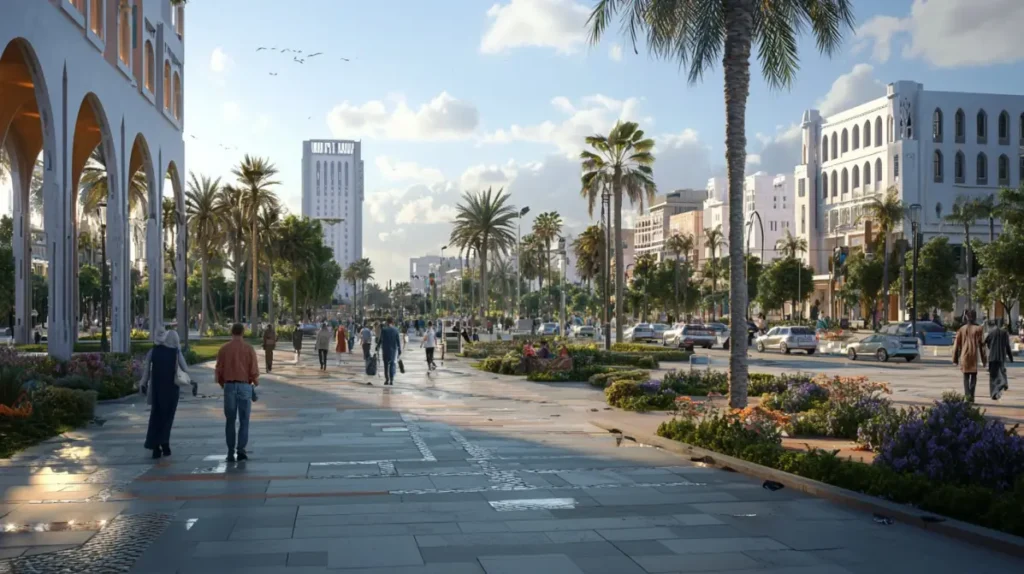
What Are the Safety Risks Expats and Tourists Should Know About in Morocco?
While Morocco is generally a safe destination, like any country, it has its own set of risks that both expats and tourists should be aware of. Being informed about common safety concerns can help ensure that your time in Morocco is enjoyable and trouble-free. This section covers the most frequent safety challenges, including petty crime, transportation safety, health considerations, and cultural sensitivities, along with practical advice on how to navigate these issues effectively.
1. Petty Crime: Pickpocketing and Scams
In Morocco, particularly in bustling tourist hubs like Marrakech, Fes, and Casablanca, petty crime such as pickpocketing and scams is the most common threat travelers and expatriates face. These crimes often occur in crowded places like markets (souks), busy squares, and popular tourist attractions. Thieves and scammers tend to target distracted visitors, making it essential to remain vigilant.
How to Avoid Common Tourist Scams:
- Secure Your Belongings: Always keep your valuables—wallets, phones, and passports—in a secure, concealed spot. Money belts or under-clothing pouches are a great way to prevent theft.
- Avoid Flashy Displays: Minimize wearing expensive jewelry or flashing large amounts of cash in public places, as this can attract unwanted attention.
- Be Wary of “Helpful” Locals: Some scammers offer unsolicited help or advice, only to demand payment afterward. Politely decline help unless you initiate the interaction.
- Fake Guides: In tourist-heavy areas, unofficial guides may approach and offer services. Always book licensed guides through reputable tour companies or your accommodation to avoid inflated prices or deceptive practices.
Expat Advice:
- For expats living in Morocco, pickpocketing and minor theft are more likely to happen in densely populated or expat-heavy neighborhoods. When navigating markets or local transportation, stay mindful of your surroundings. Many expats also recommend avoiding isolated areas late at night and using reputable ride services or taxis when traveling after dark.
2. Transportation Safety
Getting around Morocco is relatively straightforward, but transportation safety can vary depending on your mode of travel. Both expats and tourists should be mindful of certain risks when using taxis, public transportation, and car rentals.
Using Taxis and Public Transportation:
- Licensed Taxis: Always opt for licensed taxis, and ensure the meter is turned on. If there’s no meter, negotiate the fare before starting your journey. In larger cities, official taxis are often painted red (small taxis) or white (larger taxis).
- Public Transport: While public buses and trains are generally safe, they can be crowded, making pickpocketing a risk. If you’re new to the city or unfamiliar with the routes, it’s best to plan ahead or seek advice from locals or hotel staff.
- Ride-Sharing Services: Services like Uber do not operate widely in Morocco, but local alternatives such as Careem or local taxi apps can provide a more secure and trackable transportation option.
For Expats: Long-Term Transportation Options
- Car Rentals and Driving: Many expats choose to rent or buy a car, particularly if they plan to live outside major cities where public transport is less reliable. While road conditions are generally good in urban areas, driving in Morocco can be chaotic, especially in congested city centers. Ensure that you are familiar with local driving laws, carry insurance, and consider renting or purchasing a vehicle through reputable agencies.
- Traffic and Road Safety: Be mindful that driving styles in Morocco may differ from what you are used to, with more aggressive driving and unpredictable road conditions, particularly in rural areas. Always stay alert and drive defensively.
3. Health and Hygiene
When it comes to health and hygiene, Morocco poses some challenges, particularly for short-term tourists. However, expats living in Morocco can generally access adequate healthcare services if they plan ahead.
Healthcare Options for Expats:
- Clinics and Hospitals: Expats in Morocco often choose to live near cities like Casablanca, Rabat, and Marrakech, where they can access better healthcare facilities, including private hospitals and clinics with English-speaking staff. It’s essential to have health insurance that covers medical expenses abroad. Many expats purchase international health insurance plans for more comprehensive coverage.
- Pharmacies: Pharmacies in Morocco are widespread and offer a range of medications over the counter. If you’re an expat with a specific prescription, it’s advisable to bring an adequate supply, as certain medications may not be readily available.
- Emergency Care: Emergency services in larger cities are reliable, but it’s always a good idea to keep a list of private healthcare providers and their emergency numbers.
Health Tips for Tourists:
- Avoid Tap Water: Tap water in Morocco is not recommended for drinking, especially for visitors unaccustomed to it. Always opt for bottled water, which is widely available.
- Be Cautious with Street Food: While Moroccan street food is delicious, it’s wise to be selective. Choose vendors who appear to have high turnover rates, as fresh food is less likely to cause illness. Stick to cooked foods, and avoid raw fruits and vegetables unless they’ve been peeled or washed with bottled water.
- Traveler’s Insurance: For tourists, purchasing travel insurance that covers medical expenses and emergency evacuation is a good precaution in case of illness or injury.
4. Cultural Sensitivities
Morocco is a predominantly Muslim country, and both tourists and expats should be mindful of Islamic customs and cultural sensitivities, which are deeply ingrained in everyday life. Understanding and respecting these traditions will not only help ensure a smooth stay but also earn respect from locals.
Respecting Islamic Cultural Norms:
- Modest Dress: While Morocco is relatively liberal compared to some other Muslim countries, it’s important to dress modestly, especially in rural areas and during religious holidays like Ramadan. Women are advised to wear clothing that covers their shoulders and knees, and men should avoid wearing shorts in conservative areas.
- Ramadan Etiquette: During the holy month of Ramadan, it is polite to avoid eating, drinking, or smoking in public during daylight hours. Many restaurants and cafes close during this time, but exceptions are made in tourist zones. For expats, adjusting to local customs during Ramadan is crucial for integrating smoothly into Moroccan society.
- Photography: Always ask permission before photographing people, particularly in rural areas or religious sites. Some locals may be uncomfortable with their photo being taken, especially women.
Expat Integration Tips:
- Building Relationships: Expats can benefit greatly by making an effort to learn basic Arabic or French, the two most widely spoken languages in Morocco. This not only helps with day-to-day communication but also fosters better relationships with locals.
- Religious Sensitivity: While Morocco is tolerant of different religious practices, it’s important for expats to be aware of the significance of Islam in Moroccan culture. Participating in local festivals and observing important religious events respectfully can go a long way in integrating into the community.
In conclusion, Morocco offers a relatively safe and welcoming environment for both tourists and expats, provided you take the necessary precautions. By staying aware of potential risks such as petty crime, navigating transportation with care, practicing good health habits, and respecting local customs, you can enjoy the rich cultural experience Morocco has to offer with peace of mind.
Safe Places for Expats and Tourists in Morocco
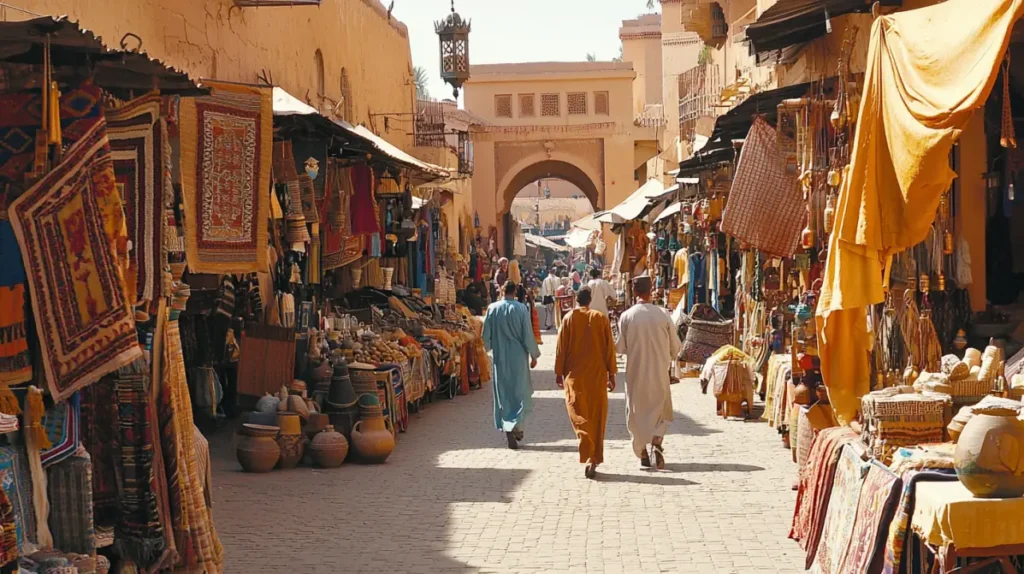
Which Cities in Morocco Are Safest for Expats and Tourists?
Morocco offers a diverse range of cities, each with its own unique charm and level of safety. While many areas across the country are welcoming and secure, some cities are particularly well-suited for expats looking for a place to live and tourists seeking an unforgettable vacation experience. Below is an overview of the safest cities for both groups, with attention to safety levels, amenities, and considerations for longer stays.
Safe Cities for Expats: Casablanca, Rabat, Marrakech, and Tangier
- Casablanca: As Morocco’s largest city and economic capital, Casablanca is a top destination for expats, particularly those working in international business or finance. The city offers a wide range of amenities, including international schools, healthcare facilities, and modern housing. Casablanca is generally safe, but like most large cities, petty crime can occur, especially in crowded areas. Expats tend to settle in well-secured neighborhoods such as Ain Diab or Anfa, which offer a combination of safety, convenience, and access to upscale services.
- Rabat: Rabat, Morocco’s capital, is one of the safest cities in the country and an excellent choice for both expats and tourists. Known for its clean, orderly streets and quieter pace compared to Casablanca or Marrakech, Rabat is home to many diplomats, international organizations, and expatriates. The city has a low crime rate, excellent public services, and a high standard of living. Expats living here enjoy access to top-notch healthcare, international schools, and a variety of secure residential neighborhoods like Souissi and Agdal.
- Marrakech: As one of the most iconic cities in Morocco, Marrakech is a popular destination for both expats and tourists. The city’s expat community is growing, with many foreigners drawn to its lively culture and warm climate. While Marrakech is generally safe, it’s important to stay vigilant in tourist-heavy areas like the medina, where pickpocketing and scams can occur. For expats, neighborhoods like Gueliz and Hivernage offer a mix of modern amenities and safety, making them popular choices for long-term stays.
- Tangier: Tangier, located on Morocco’s northern coast, has a rich history of international influence, making it a cosmopolitan city popular among expats. Known for its strategic location near Europe, Tangier is ideal for those looking to enjoy a relaxed lifestyle with easy access to both African and European markets. Safety levels in Tangier are high, with expatriate-friendly neighborhoods like Malabata and California providing secure living environments. The city has seen a resurgence in recent years, attracting both tourists and investors due to its development projects and improved infrastructure.
Safe Tourist Destinations: Fes, Agadir, Essaouira, Chefchaouen
- Fes: Fes is one of Morocco’s most historically significant cities and a popular tourist destination known for its well-preserved medieval architecture. While the ancient medina can be busy and chaotic, Fes is generally considered safe for tourists. The local police keep a close eye on tourist areas, and crime rates are relatively low. For a peaceful stay, it’s best to choose accommodations in areas like the newer part of town (Ville Nouvelle) or high-rated riads inside the medina that provide security and comfort.
- Agadir: A modern coastal city on the Atlantic Ocean, is one of Morocco’s top beach destinations, known for its sunny climate, sandy shores, and relaxed vibe. Tourists flock to Agadir for its safe environment, resorts, and laid-back atmosphere. The city is considered very safe for tourists, with well-developed infrastructure, numerous beachfront hotels, and an active tourism police force. Agadir also has a growing expat community, particularly retirees, drawn by its favorable weather and coastal lifestyle. While crime rates are low, travelers are advised to stay cautious in busy areas like the markets or when exploring the city at night.
- Essaouira: This charming coastal town is a favorite for travelers seeking a more relaxed, seaside experience. With its laid-back atmosphere, Essaouira offers a safe environment for tourists to explore its beautiful beaches, artistic culture, and historical sites. Crime in Essaouira is rare, and the town’s small size makes it easy to navigate. Visitors often feel secure walking around the town center and enjoying the scenic oceanfront.
- Chefchaouen: Known as the “Blue City” for its striking blue-painted buildings, Chefchaouen is a peaceful and safe destination for tourists looking to explore the Rif Mountains. The city is small, tranquil, and welcoming to visitors, with low crime rates and friendly locals. While scams or pickpocketing can occur in larger cities, Chefchaouen’s laid-back nature makes it one of the safest places for tourists to visit in Morocco.
Areas to Be Cautious In
While Morocco is generally safe, there are a few areas where tourists and expats should exercise more caution:
- Remote Areas: In some rural regions, particularly those far from major cities, medical facilities, and law enforcement presence may be limited. Travelers venturing into the Atlas Mountains or the Sahara Desert should ensure they have reliable guides and emergency plans in place.
- Western Sahara: This region is politically sensitive due to ongoing territorial disputes, and while many areas are peaceful, it’s advised to research the current situation before traveling here. Expats and tourists are generally discouraged from visiting without a thorough understanding of the risks involved.
Section 4: Safety Tips for Expats and Tourists in Morocco
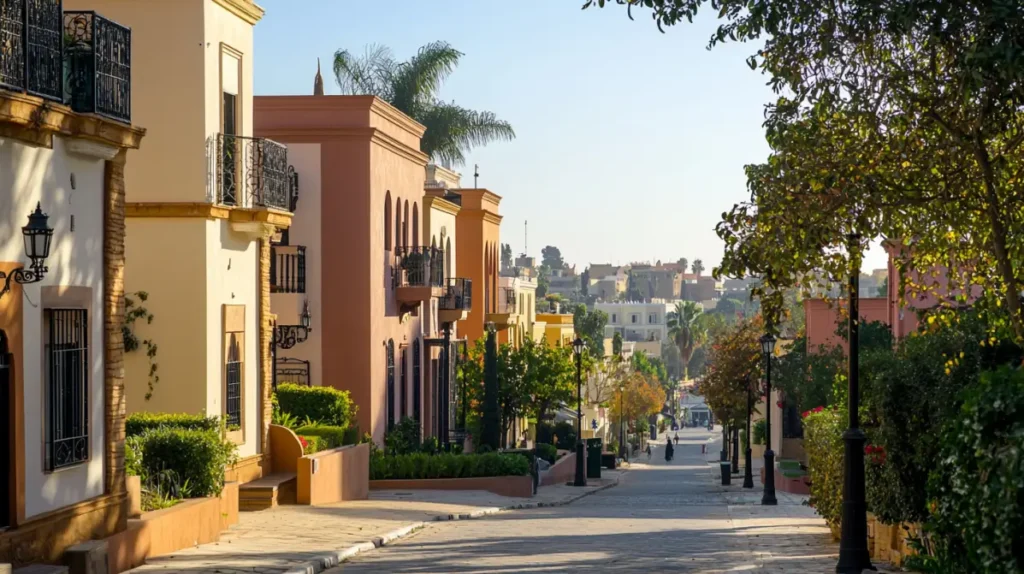
Essential Safety Tips for Expats and Tourists in Morocco
To ensure a safe and enjoyable experience, both expats and tourists should follow these essential safety tips, ranging from housing security to handling money and accessing emergency services.
1. Housing Security for Expats
Finding secure housing is one of the most important aspects for expats settling in Morocco. Here are some key recommendations:
- Choose Reputable Agents: When renting or purchasing a home, work with reputable real estate agents who understand the local market. They can help you find properties in safe neighborhoods with good amenities.
- Securing Your Home: Look for properties in gated communities or apartment complexes with 24/7 security, particularly in larger cities like Casablanca or Marrakech. Many expats choose to live in neighborhoods with high expatriate populations, where security measures tend to be more robust.
- Negotiating Leases: Ensure that your lease includes details about security provisions, maintenance responsibilities, and utilities. In Morocco, leases can often be negotiated, so it’s worth discussing terms with landlords to ensure all your needs are covered.
2. Tourist Accommodation Safety
When visiting Morocco, choosing the right accommodation can significantly impact your safety and comfort. Follow these tips:
- Stay in Well-Reviewed Hotels and Riads: Always book accommodations with high ratings and reviews that emphasize safety. Riads (traditional Moroccan houses with courtyards) in the medina can be charming and secure, especially when they offer 24-hour front desk service and security measures.
- Use Reputable Booking Platforms: When selecting a hotel or riad, use trusted booking platforms like Booking.com or Airbnb, where you can filter for highly-rated properties with safety features.
- Secure Your Belongings: While staying at hotels or riads, make use of in-room safes for your passport, cash, and valuable items. Keep a copy of important documents in a separate location.
3. Handling Money
Managing money safely is crucial, especially in a country where cash transactions are common.
- Safe Currency Exchanges: It’s best to exchange money at official banks, exchange bureaus, or ATMs. Avoid street money changers who may offer unfavorable rates or counterfeit bills.
- For Expats: Opening a Local Bank Account: Expats staying long-term should consider opening a local bank account for daily transactions. Local banks like Attijariwafa Bank or BMCE offer accounts tailored to expatriates, making it easier to pay bills and handle finances securely.
- Use Credit Cards with Caution: While larger hotels and restaurants accept credit cards, smaller businesses may prefer cash. Be cautious when using ATMs, especially in less populated areas. Choose machines located inside bank branches for added security.
4. Emergency Contacts and Safety Apps
Staying connected to local authorities and being aware of safety alerts is essential for both tourists and expats.
- Emergency Numbers: In case of emergency, dial 19 for police, 15 for an ambulance, and 15 for the fire department. For non-urgent issues, many expats rely on their local embassy for advice and assistance.
- Safety Apps: Install safety apps like “SOS Maroc” for emergency assistance or “Careem” for secure transportation. Other apps like “TripWhistle Global SOS” can provide international emergency contact numbers and guidance.
- Staying Informed: Subscribe to local safety alerts or news apps to stay informed about any potential safety risks in your area. For expats, the embassy often provides safety updates, especially during holidays or large public events.
By following these safety tips and choosing secure housing or accommodations, handling money wisely, and keeping emergency contacts at hand, both expats and tourists can enjoy their time in Morocco with greater peace of mind.
Section 5: Solo Travelers, Female Travelers, and Families
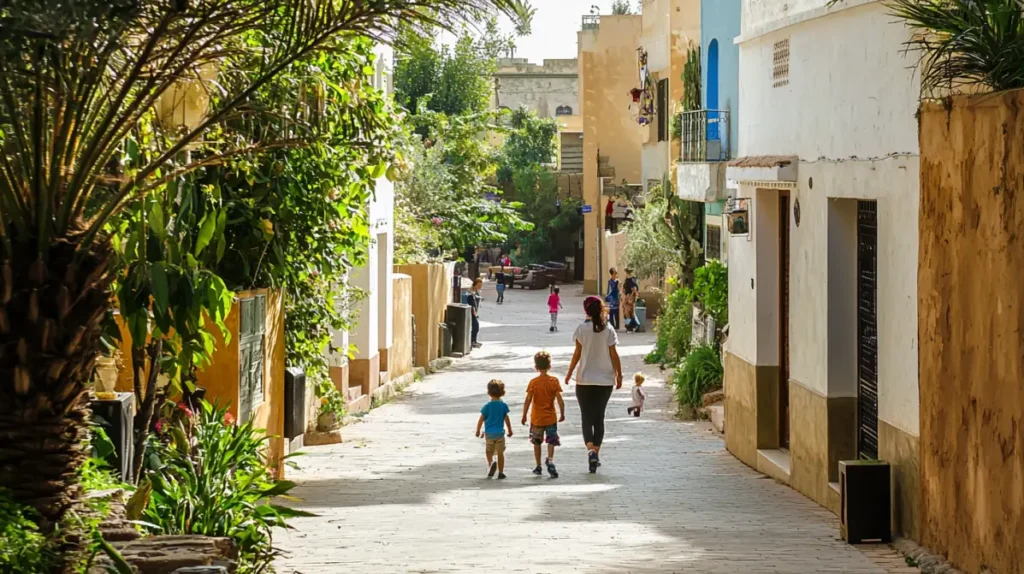
Is Morocco Safe for Solo Female Travelers and Families?
Morocco is a popular destination for a variety of travelers, including solo adventurers, female tourists, and families. While the country generally offers a safe environment, each group may have unique concerns and precautions they need to consider to ensure their experience is comfortable and secure.
Solo Expats: Building a Local Support Network for Safety and Socialization
For solo expats living in Morocco, safety is usually not a major concern, especially in larger cities like Casablanca, Rabat, and Marrakech. However, building a local network can greatly enhance your sense of security and connection. Here are some key points to keep in mind:
- Join Expat Communities: Connecting with other expats through local meetups, clubs, and online communities can help you build a support system. These networks often provide valuable advice on navigating daily life, safety, and social opportunities.
- Get to Know Your Neighbors: Creating bonds with locals and your neighbors can provide you with added security. Moroccans are generally very hospitable, and having locals look out for you can enhance your safety.
- Stay Informed: Keep up with local news and any safety alerts. Embassies or expat groups often provide regular updates on regional security issues.
Female Tourists and Expats: Addressing Street Harassment and Dressing Modestly
Morocco is generally safe for female travelers and expatriates, but there are a few gender-specific concerns, especially for those traveling alone or moving to Morocco long-term.
- Street Harassment: While street harassment can occur, particularly in crowded areas or tourist-heavy spots, most of it is non-violent and verbal. Solo female travelers and expats can minimize unwanted attention by dressing modestly and being aware of their surroundings. Ignoring catcalls or walking with purpose often discourages further attention.
- Modest Dressing: Female travelers and expats should aim to dress conservatively, especially when visiting rural areas or religious sites. Covering shoulders and knees is a simple way to respect cultural norms and blend in. In more liberal cities like Casablanca or Rabat, the dress code is more relaxed, but modesty is still appreciated.
- Solo Female Expats: For those relocating to cities like Marrakech or Tangier, it’s advisable to live in secure neighborhoods and stay in well-lit areas after dark. Being part of a female expat group can offer additional safety, as well as social connections.
Families: Child-Friendly Neighborhoods and Tourist Attractions
Morocco is a family-friendly country with a strong sense of community. Families traveling or moving to Morocco can expect a welcoming atmosphere, particularly in family-oriented neighborhoods and tourist attractions.
- Child-Friendly Neighborhoods for Expats: Cities like Rabat and Casablanca have residential areas that are ideal for families, offering parks, schools, and gated communities with good security. Neighborhoods like Souissi (Rabat) and Anfa (Casablanca) are known for being safe and family-friendly.
- Family-Friendly Tourist Attractions: Morocco offers a variety of activities that are enjoyable and safe for families. Essaouira’s beaches, Ouzoud Waterfalls, and Jardin Majorelle in Marrakech are excellent destinations for families with children. The country’s vibrant culture and outdoor adventures make it an ideal place for both learning and fun.
Section 6: In Case of Emergency: What Expats and Tourists Should Know
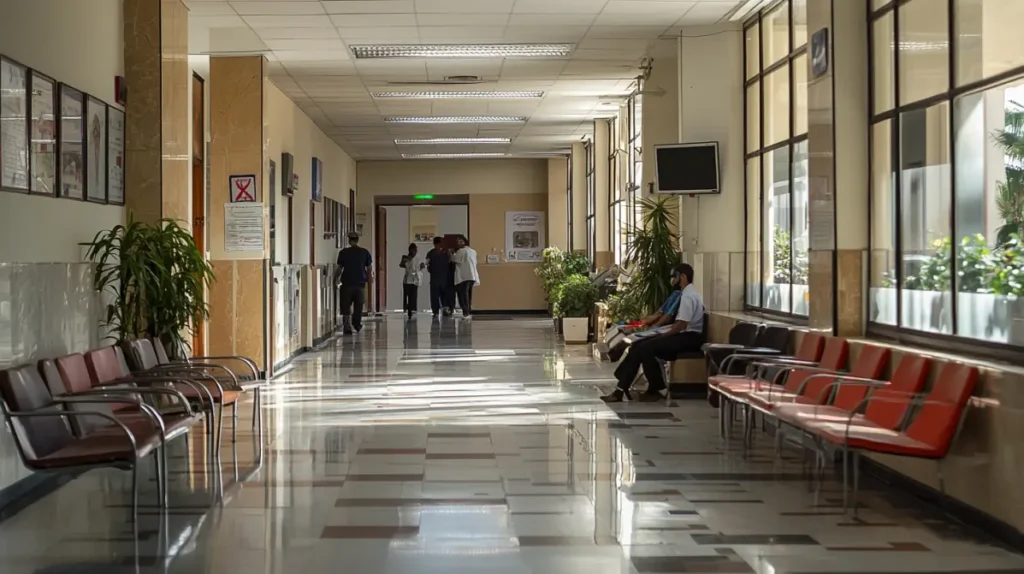
Emergency Resources and Contacts for Expats and Tourists in Morocco
While Morocco is generally safe, it’s important to be prepared for emergencies. Whether you’re a tourist or an expat, knowing how to access emergency services can give you peace of mind during your stay.
Emergency Phone Numbers for Expats and Tourists
- Police: Dial 19 for police services in major cities and 177 in rural areas.
- Ambulance and Medical Emergencies: Dial 15 for medical assistance or to request an ambulance.
- Fire Department: For fire emergencies, dial 15.
Healthcare for Expats
Morocco has a range of public and private healthcare facilities, with private clinics in major cities offering the best standards for expats. Here’s what expats should know:
- Emergency Clinics: In case of emergencies, head to one of the major private hospitals or clinics, particularly in Rabat, Casablanca, or Marrakech. These facilities offer higher-quality care and often have English-speaking staff.
- Health Insurance: It is advisable for expats to secure international health insurance that covers private care, as public healthcare can be limited, especially in rural areas. Many expats opt for international plans to cover emergency evacuations and specialized care.
Tourist Emergency Contacts
For tourists, it’s essential to know how to reach your embassy or local authorities if you encounter issues. Here are a few steps to take:
- Embassies and Consulates: Always keep the contact information for your country’s embassy or consulate handy. They can assist with lost passports, legal issues, and emergencies.
- Police Assistance: If you find yourself in a non-life-threatening situation, such as a theft or scam, you can report it to the local police (tourism police if available). Ensure you get a report, especially if you plan to file an insurance claim.
Is Morocco Safe in 2024-2025? Our Final Thoughts
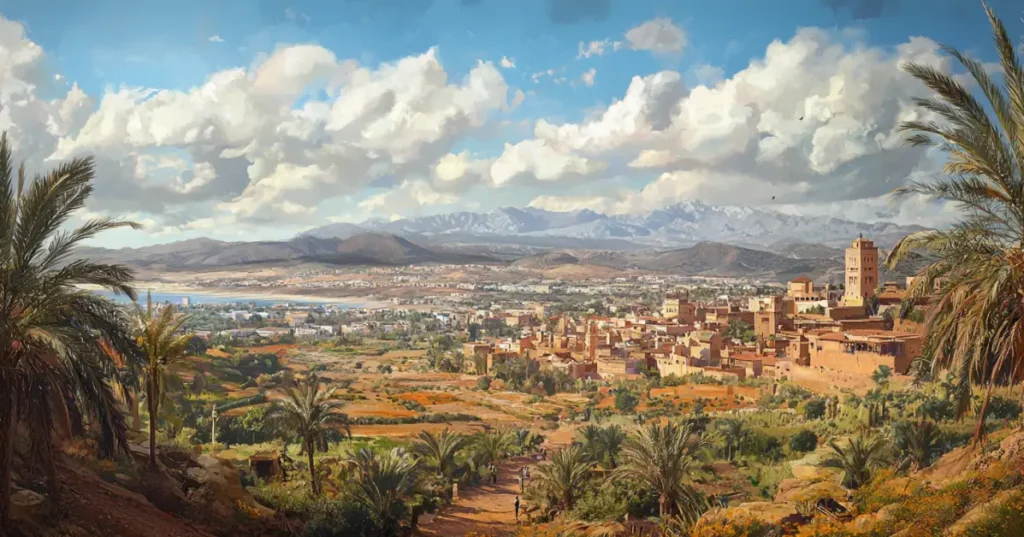
Final Verdict: Is Morocco Safe for Expats and Tourists?
Morocco continues to be a safe and welcoming destination for both expats and tourists in 2024-2025. With its rich culture, vibrant cities, and diverse landscapes, the country offers something for everyone.
While there are some safety concerns, such as petty crime in tourist areas and street harassment, most of these can be mitigated with common-sense precautions and awareness. Expats living in Morocco tend to enjoy a secure lifestyle, especially in cities with established expatriate communities like Rabat, Casablanca, and Marrakech. Tourists are similarly able to explore the country’s wonders with confidence, provided they follow local guidelines and remain mindful of their surroundings.
By preparing ahead, staying informed, and respecting cultural customs, visitors and residents alike can fully embrace the beauty and adventure that Morocco offers.
Conclusion: Key Takeaway
Morocco is a vibrant and safe destination for both short-term visitors and long-term expatriates. With the right preparations, it’s possible to enjoy everything from the bustling markets of Marrakech to the serene beaches of Essaouira. Whether you’re exploring as a solo traveler, moving with your family, or looking for a new adventure as an expat, Morocco provides a unique and secure environment to live and explore.
“Ready to visit or move to Morocco? Follow our guide, take necessary precautions, and enjoy this beautiful country to its fullest.”
Frequently Asked Questions About Safety in Morocco
Is Morocco Safe for Tourists in 2024?
Yes, Morocco is generally safe for tourists in 2024. Most travelers find the country welcoming and secure, especially in popular tourist destinations like Marrakech, Fes, and Essaouira. However, it’s important to take common-sense precautions and be aware of petty crimes such as pickpocketing.
Is It Safe to Visit Morocco Alone?
Solo travelers, including women, can safely explore Morocco by staying vigilant, dressing modestly, and avoiding isolated areas after dark. Cities like Rabat and Marrakech are particularly welcoming for solo travelers.
Is Marrakech Safe for Tourists?
Marrakech is one of the most popular tourist destinations in Morocco, and it is generally safe. However, it’s a busy city with crowded markets where petty theft can occur, so it’s important to remain alert and take precautions, especially in the medina.
How Safe Is Morocco for Americans?
Morocco is considered safe for American tourists and expats. The government has put in place security measures to protect visitors, and many Americans travel to Morocco without any major safety concerns.
Is Casablanca Safe for Expats?
Yes, Casablanca is a modern city and a top destination for expats. It offers a range of secure neighborhoods and amenities for foreigners, making it a great choice for long-term stays.
